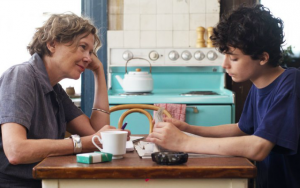20TH CENTURY WOMEN: 4 STARS. “feels airy and grounded at the same time.”
The word quirky gets thrown around a lot in reference to character driven indie films. “20th Century Women,” the Mike Mills (the director not the REM guitarist) coming of age story starring Annette Bening and Greta Gerwig, falls under that umbrella, presenting an off beat story of mothers, friends and lovers that luckily never allows it’s idiosyncrasies to become twee.
The film is set during one turbulent summer in 1979 in a creaky old boarding house run by single Santa Barbara mom Dorothea Fields (Annette Bening). Boarders include artsy cancer survivor Abbie (Gerwig) and William (Billy Crudup), a good-looking hippie carpenter with a way with a hammer and women. At the center of the story is Dorothea’s 15-year-old son Jamie (Lucas Jade Zumann), a sensitive boy with an unrequited crush on platonic friend Julie (Elle Fanning).
At the cusp of the eighties Dorothea, a “child of the Depression,” finds herself disconnected from Jamie, unsure if she knows exactly how to raise a teenage boy in a changing world. William and the boy didn’t bond so she turns to Abbie and Julie for help. “You get to see him out in the world as a person,” Dorothea saus to Abbie. “I never will.”
Based on Mills’s teenage years, “20th Century Women” is a coming-of-age filtered through the lens of a very specific era. The music of The Talking Heads fills the soundtrack, Abbie’e punk style includes a shock of purple hair and loose-limbed dancing while Julie embraces the feminist principles of the day. In this swirl of art, change and sexuality Jamie enters manhood with a trio of twentieth century women as his cobbled-together family.
It’s the story of a teenage boy but it is just as much a study of the women in his life, each of whom is unique, interesting and arrive in the film fully formed. No mother or girlfriend figureheads here.
Leading the charge is Bening who heads the ensemble with supreme ease, playing Dorothea as an eccentric but warm presence, a woman grappling with change and the idea her son is growing up too fast.
Gerwig borders on typecasting, taking on the role of the gloomy, sexualized Abbie. It’s a character that seems to fit comfortably in her wheelhouse and then, with no noticeable effort she reminds us why her delicate portrayals of interesting people strike such a chord in movie after movie.
Fanning, the third corner of this triangle, mixes sweetness and ferocity, brewing up a potent cocktail of teenage rebellion.
Structurally the film suffers from the odd hiccup but tremendous performances that feels airy and grounded at the same time bring humanity and empathy to a story that is specific in its time and place but universal in its scope.

